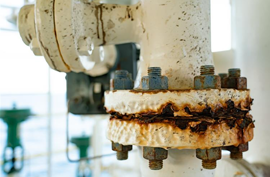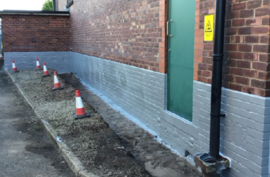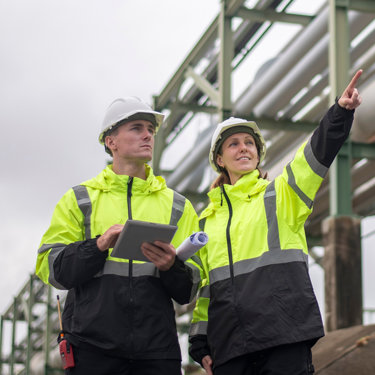Cost-saving pollution prevention after undetected 50,000-litre diesel spill
Published: 4 May 2022
With every pollution event comes an opportunity for positive change.
When we received an emergency call about a 50,000 litre diesel spill at a water utilities company, we took immediate action to contain contamination and safeguard a nearby river and aquifer. We also helped our client become a better, more responsible business.
Our experts implemented best practice processes to prevent future environmental harm, while heading off millions in potential fines.
The challenge
The turning point event began when a contractor accidentally pierced a fuel line during site works at a water treatment plant.
Below ground, a damaged diesel tank – used for backup power generation – leaked 50,000 litres of fuel into the surrounding area, placing local water sources at risk.
With no monitoring, air testing, or maintenance records in place, the spill was left undiscovered until the tank was due for a routine refill.
Our solution
After our client raised the alarm, we responded with urgent clean-up capabilities, specialist onsite crews, and a long-term improvement strategy.
Comprehensive ground investigations revealed the volume of the spill – and the urgency of protecting area water sources, including a principal aquifer below the site and a river only 50 metres way.
Oil was recovered with speed and minimal environmental impact in mind:
- Engineers constructed a negative gradient to prevent fuel from flowing into waterways.
- An ad hoc pump and treat system separated vast quantities of oil from polluted water.
- Onsite wells were cleared and emptied of collected contaminants.
- Drainage jetting removed residual pollutants from site sewers.
- Borehole drilling provided quick access to groundwater samples.
To save time and money, we returned treated effluent water to the plant’s drainage framework and used their processing systems to avoid tankering wastewater offsite.
Investigation and assessment
Following the call into our national emergency helpline, we immediately established a highly skilled clean-up crew onsite.
Above and below-ground investigations determined the scale of contamination and immediate containment priorities, while informing a longer-term remediation plan.
- Excavators carried out initial ground investigation work to gauge the severity of the spill.
- Specialist teams pinpointed vulnerable receptors on and around the site.
- Critical work began to control and capture leaked fuel, protecting a principal aquifer below the site.
- Essential pumping systems created a negative water gradient to prevent fuel from reaching a river 50 metres away.
Remediation
The operation evolved from emergency clean-up to longer-term remediation, monitoring, and process improvement.
Efficiency, cost-savings, and responsible environmental practices shape every element of our ongoing client support.
Our expertise protected the treatment plant’s nearby water sources from large-scale contamination, preventing significant harm to wildlife and human health – and millions in regulatory fines.
The decision was later taken to decommission the compromised tank and, three years on, we continue to monitor the area and help our client cut risk, compliance issues, and costs – without cutting corners.
- 70,000 litre above-ground temporary tanks installed to contain and manage spilled fuel.
- Emergency pump and treat system and temporary separators implemented onsite.
- Volumes of leaked diesel flushed and emptied from foul wet wells and drains.
- Comprehensive aftercare programme of groundwater monitoring, sampling, and asset maintenance.
Our client has modernised maintenance, testing, and pollution prevention processes – reducing the risk of future spills, reputational damage, and financial penalties.
The outcome
- £0m£8 million potential fine avoided for a 50,000 litre oil spill
- £0k£700,000 remediation costs.
- 0k30,000 litres of fuel recovered from surrounding areas.
- Local river and aquifer protected from contamination
- Greatly enhanced monitoring and recording processes
- Ongoing asset maintenance to reduce risk
- Improved compliance performance
- Targeted action against future pollution events
More from our Knowledge Hub
 Insights
InsightsMitigating climate change risks through planned preventive maintenance
 Insights
InsightsProtective coatings: Safeguarding infrastructure against climate change
 Insights
InsightsDelivering the Water (Special Measures) Act: Supporting compliance and innovation
 Insights
InsightsA guide to navigating climate change regulations for UK businesses
Environmental compliance today, creating a sustainable tomorrow
Helping you reduce risk to the environment and your operation by managing assets compliantly while achieving commercial, ESG, and net-zero goals.
Contact our experts

